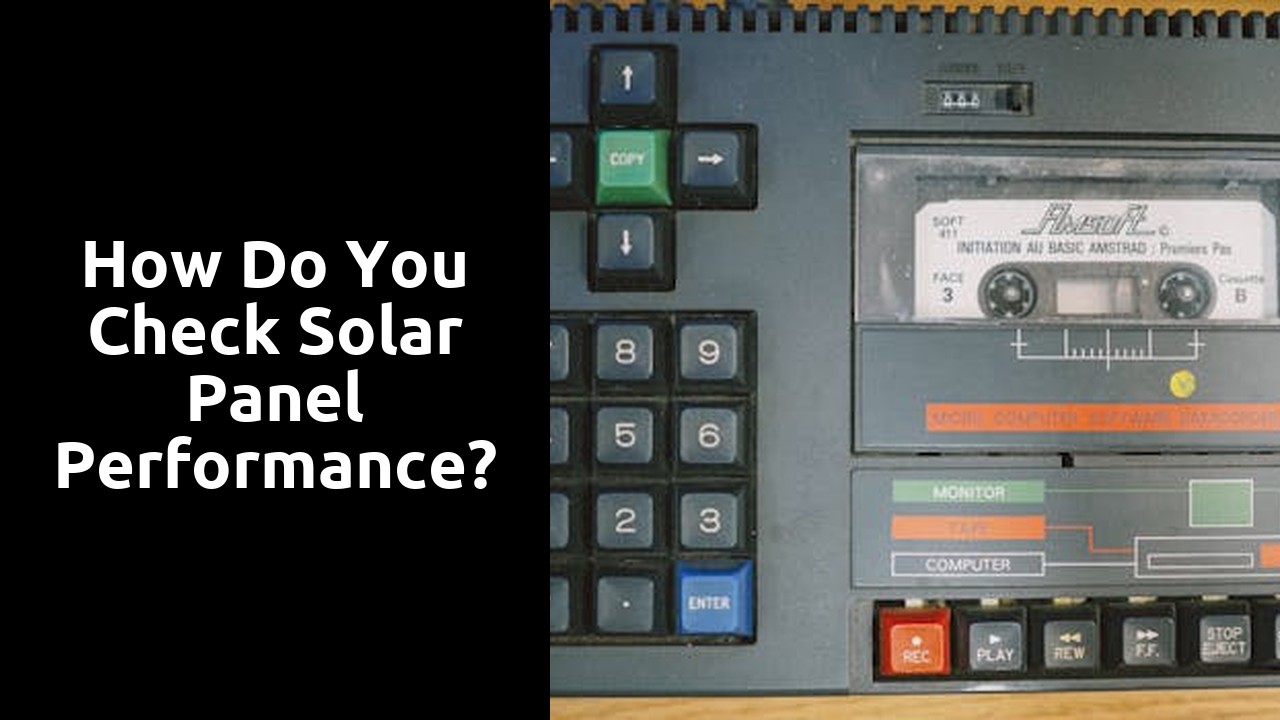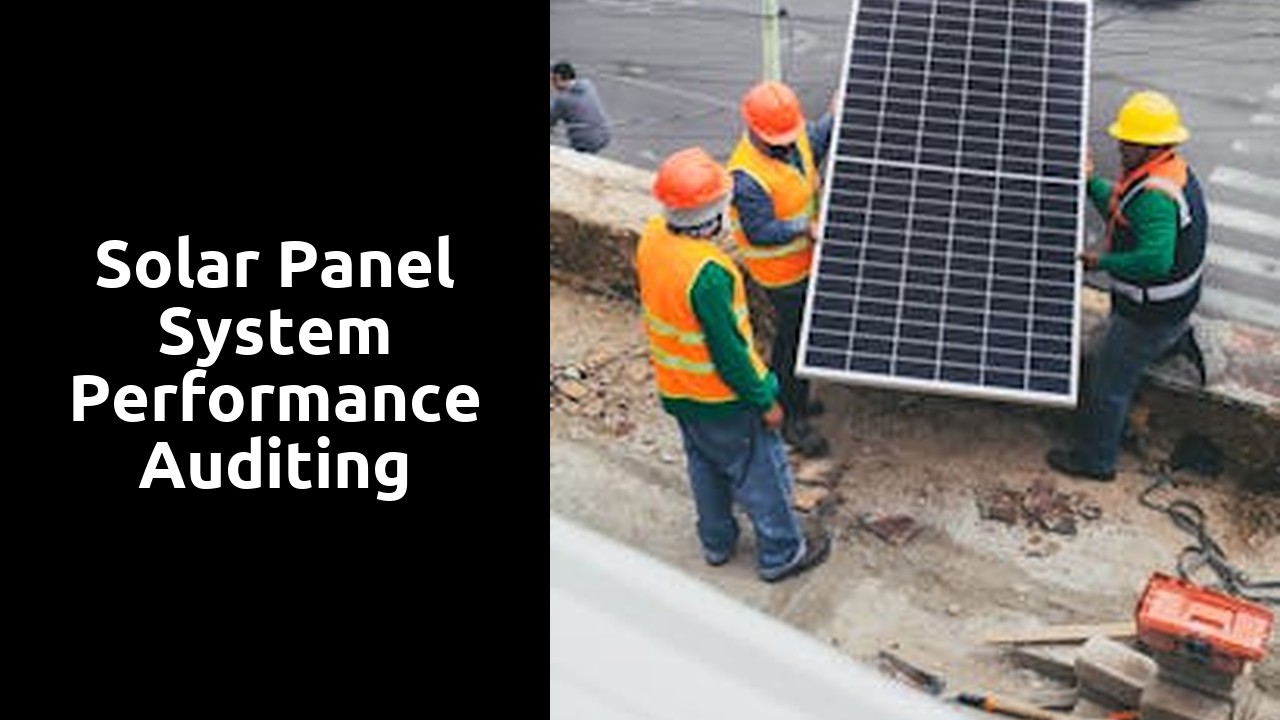
Enhancing Solar Panel Lifespan
To significantly prolong the lifespan of solar panels, implementing routine maintenance and regular cleaning practices is paramount. Ideally, panels should be cleaned several times throughout the year, particularly in regions prone to dust or pollution. Regular inspections can help detect any potential issues early on, ensuring that the system operates efficiently over an extended period. As part of a proactive approach to maintenance, it is essential to schedule periodic Solar Panel System Performance Auditing by qualified professionals to conduct thorough assessments and identify areas for improvement.
Furthermore, investing in quality components and ensuring correct installation are crucial factors that contribute to enhancing the longevity of solar panels. By choosing reputable suppliers and adhering to recommended installation practices, the risk of premature wear and damage can be minimised. Additionally, monitoring the performance of the system over time, particularly during extreme weather conditions, can help pinpoint any inefficiencies or issues. Ultimately, safeguarding the longevity of solar panels involves a combination of proactive maintenance, quality installations, and regular Solar Panel System Performance Auditing.
Implementing Regular Cleaning and Maintenance Practices
To ensure optimal Solar Panel System Performance Auditing, regular cleaning and maintenance practices are vital. Australia's diverse weather conditions can impact the efficiency of solar panels, making it imperative to keep them free from dust, debris, and bird droppings. Cleaning the panels with a soft brush, mild detergent, and water helps in removing any accumulated dirt that may hinder sunlight absorption. Regular maintenance checks should also be conducted, inspecting for any signs of damage or wear that could affect the overall performance of the solar panel system.
Implementing a proactive approach to cleaning and maintenance not only assists in maximising the lifespan of the solar panels but also enhances their energy efficiency. By keeping the solar panels well-maintained and clean, you can ensure that they continue to operate at peak performance levels, generating optimal electricity output. Scheduled inspection and cleaning routines can significantly contribute to prolonging the durability and effectiveness of your solar panel system, ultimately leading to greater energy savings and environmental benefits.
Calculating Solar Panel Efficiency
When it comes to assessing the efficiency of solar panels, understanding how to calculate their performance is crucial. The efficiency of a solar panel is determined by how well it converts sunlight into usable electricity. To calculate solar panel efficiency, you can use a simple formula: divide the power output of the solar panel by the total amount of sunlight energy that falls on the panel. This will give you a percentage that represents the efficiency of your solar panel in converting sunlight into electricity. Understanding this calculation is essential for evaluating your solar panel system performance auditing.
Solar panel efficiency plays a significant role in determining the overall effectiveness of a solar energy system. By calculating the efficiency of your solar panels, you can gauge how well they are performing and identify any areas for improvement. Monitoring the efficiency of your solar panels over time can help you track their performance and ensure that your system is operating optimally. Regularly assessing the efficiency of your solar panels is a key component of maintaining a high-performing solar energy system.
Understanding the Relationship Between Sunlight and Output
Understanding the Relationship Between Sunlight and Output
Solar panels function optimally when exposed to direct sunlight, as sunlight contains energy in the form of photons that are converted into electricity by the panels. It is crucial to note that the angle at which sunlight hits the panel, the duration of exposure, and any obstructions like shading can significantly impact the energy output. To assess the efficacy of a solar panel system, it is essential to measure its output under varying sunlight conditions, as this directly correlates with its performance and efficiency.
When conducting a Solar Panel System Performance Auditing, it is vital to consider the solar irradiance levels, which indicate the amount of sunlight hitting the panels. Higher solar irradiance levels lead to increased power generation, while lower levels result in reduced energy output. Thus, understanding the relationship between sunlight and panel output is pivotal in evaluating the efficiency and overall effectiveness of a solar panel system. By monitoring these factors regularly, one can make informed decisions to enhance the system's performance and ensure its longevity.
Comparing Solar Panel Performance
When it comes to evaluating solar panels, comparing their performance is essential for ensuring optimal efficiency and output. To commence this process, a systematic examination known as Solar Panel System Performance Auditing needs to be implemented. This auditing method involves closely monitoring the energy production of various solar panels to determine their efficacy under different conditions such as sunlight exposure and weather variations.
By conducting Solar Panel System Performance Auditing, experts can accurately compare the performance of different solar panels and identify any disparities in their efficiency levels. This analysis is crucial for determining the viability of specific solar panels in different environments and climates. Additionally, comparing solar panel performance through auditing allows for the selection of the most suitable solar panels for maximizing energy production and return on investment in solar energy systems.
Analyzing Variations in Different Weather Conditions
Weather conditions play a crucial role in influencing the performance of solar panel systems. Factors such as temperature, sunlight intensity, and cloud cover all have a significant impact on the amount of energy generated by the panels. For example, solar panels tend to perform more efficiently in cooler temperatures as opposed to extremely hot climates. In regions where there are frequent cloud cover or smog, there may be a decrease in the amount of sunlight available, thereby affecting the output of the solar panels. To accurately measure the impact of weather conditions on solar panel system performance, regular monitoring and analysis are essential.
Solar Panel System Performance Auditing involves assessing how weather variations affect the efficiency of solar panels. During periods of extreme weather events such as heavy storms or snow, solar panel systems may be temporarily obstructed or damaged, leading to decreased performance. In contrast, during clear and sunny days, the solar panels can harness more sunlight and produce higher levels of energy. By closely examining these weather patterns and their impact on solar panel output, it is possible to adjust energy production expectations and optimize the performance of the solar panel system.
FAQS
How can I enhance the lifespan of my solar panels?
Regular cleaning and maintenance practices can significantly increase the lifespan of solar panels. Additionally, ensuring proper installation and monitoring for any signs of wear and tear can help maintain their performance. ####
How do I calculate the efficiency of my solar panels?
Solar panel efficiency can be calculated by dividing the power output of the panel by the total solar energy received. This calculation helps determine how effectively the solar panels are converting sunlight into usable electricity. ####
What is the relationship between sunlight and solar panel output?
The amount of sunlight received directly affects the output of solar panels. More sunlight leads to higher electricity production, while factors like shading and orientation can impact the overall performance of the panels. ####
How can I compare the performance of different solar panels?
To compare solar panel performance, you can look at factors such as efficiency ratings, warranties, and customer reviews. Additionally, analyzing real-world data on output in various weather conditions can provide insights into the overall performance of different panels. ####
How do different weather conditions affect solar panel performance?
Weather conditions like temperature, humidity, and cloud cover can influence the efficiency of solar panels. Understanding how different weather patterns impact performance can help in optimizing the output of your solar panel system.
